Recently, I read a 100-page report written by Research And Markets.com last year, analyzing the current state and future development of the online poker market. The report predicts that by 2032, the global online poker market size will reach $283.4 billion, while the current market size is approximately $96.8 billion.
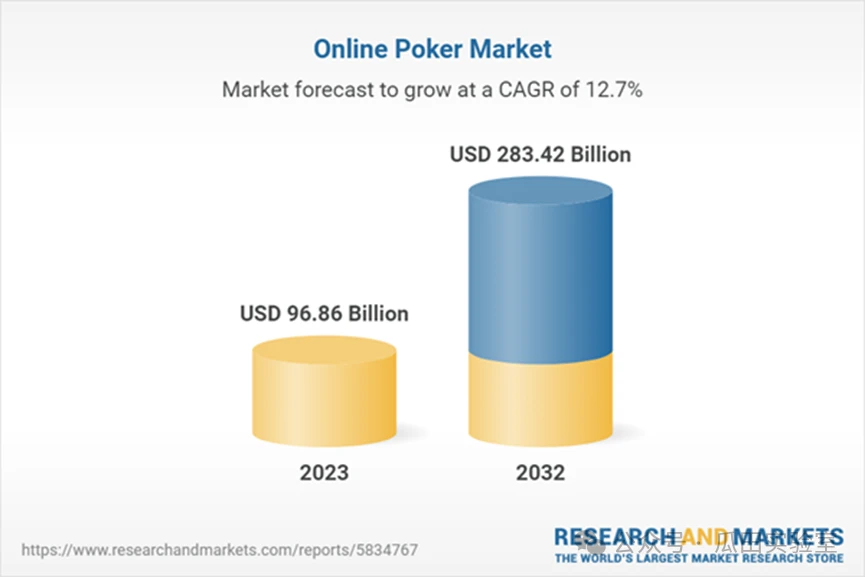
Texas Hold'em is the largest segment of competitive online poker, with other variants like Omaha being smaller in scale. Therefore, this article will specifically analyze the necessity and practical cases of combining competitive online Texas Hold'em with WEB3. Online Texas Hold'em is further divided into two categories: cash games and tournaments. Cash games are similar to what people often play at offline gatherings, allowing multiple buy-ins. Currently, cash game Texas Hold'em is mostly classified as gambling internationally, while tournament-style Texas Hold'em has been recognized as an electronic sports competition in many countries and regions, such as Germany, the UK, Switzerland, and several states in the US. The Taiwan region in Southeast Asia has also clearly established laws supporting Texas Hold'em tournaments as a form of esports.
To be honest, I've been playing Texas Hold'em for over a decade, but I’m more of a casual player with a poor skill level, so I don't have a strong addiction. However, I have done a lot of theoretical research, buying several books to take notes, and I never tire of watching various Texas Hold'em videos. I really didn't expect that online Texas Hold'em is a billion-dollar business. After entering the crypto space, I found that the proportion of friends playing Texas Hold'em in this circle is not less than that in the financial sector, for several reasons:
First, although Texas Hold'em involves skill and psychology, the underlying gambling nature and luck are fundamental factors that attract players;
Second, those who can thrive in this circle are either proficient in numbers or social butterflies, and Texas Hold'em is most suitable for these two types of people;
Third, crypto enthusiasts face their computers every day, and having an easy-to-play online game as a social tool helps enhance emotional value.
Thus, the user profiles in the crypto circle and the player attributes of Texas Hold'em can overlap significantly. It’s no wonder that after we engaged more with the WEB3 Texas Hold'em community, we astonishingly discovered that many top players frequently appearing in high-stakes cash games on platforms like WPTpoker or Hustler are actually big shots in the crypto space…
If the overlap in characteristics between the two circles were the only narrative, it wouldn’t be compelling enough to keep W Labs researching "crypto + online Texas Hold'em" for so long. Friends of W Labs should know that in our second lengthy research article in mid-2022 titled "The Future Path of GameFi Chain Game Economic Models" (https://mirror.xyz/0x5c15d8bE6A1dcb715d998d60ed06732f71DCf432/PZscW7w1sbaOdXRUriLYZy8NZKYHH9cb8alShek4Lyc), we specifically used Texas Hold'em as an example to illustrate what types of games are suitable for becoming chain games.
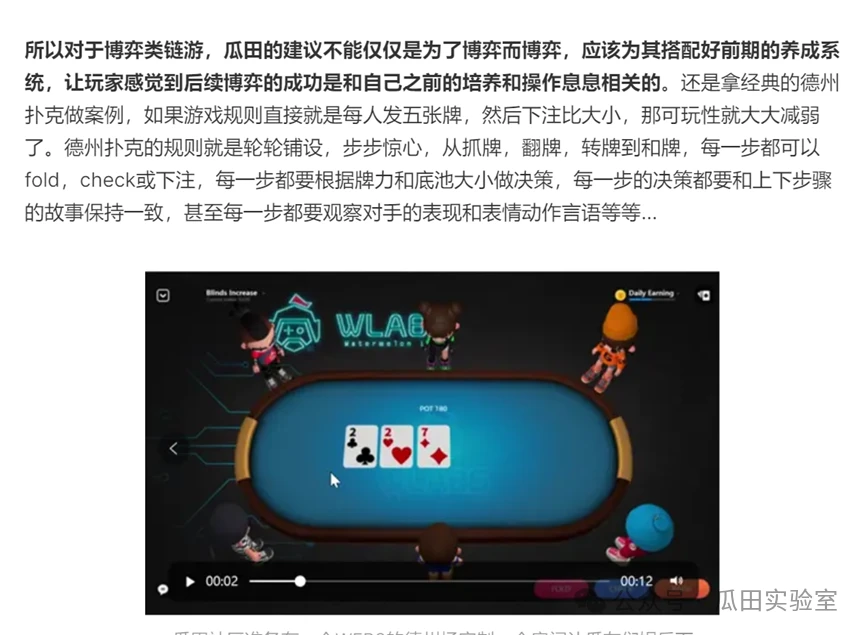
Looking back at this article now, it merely argued that games with "easy to learn + thrilling" rules are best suited for chain games, but it did not analyze how integrating the main characteristics of blockchain into online Texas Hold'em could fundamentally improve certain aspects of the original industry.
W Labs partner Huige wrote an article at the end of 2022 titled "Comparative Analysis of Texas Hold'em GameFi Games" (https://mirror.xyz/0x5c15d8bE6A1dcb715d998d60ed06732f71DCf432/PbYqPxB7EuRBs3AGuVxIokA8KmgtyZ2QFAYoDUxxEM4), which touched on some potential changes that blockchain technology could bring to online Texas Hold'em. The reason we wrote this article at that time was actually a byproduct of providing economic model consulting services for a WEB3 Texas Hold'em project, where we simply wrote down some thoughts. The article briefly mentioned the convenience of payments and the transparency of dealing, both of which can be improved using blockchain technology. Fast forward two years, and it’s gratifying to see that some of these points are already being developed and validated.
Two years have passed, and the WEB3 industry has experienced ups and downs, with practitioners coming and going. After personally experiencing the helplessness of "it's all a bubble," we have become more focused on researching projects that could leverage the characteristics of blockchain to change a WEB2 industry or product, even if it’s just a small change. This feels more reassuring than the Ponzi scheme mentality of "I know it will definitely collapse, but I believe I can run faster than others." Therefore, in the current sluggish market, we have selected some tracks or products to closely follow and analyze, hoping to see them develop long-term, with the online Texas Hold'em track being the first target we identified.
### 1. How Blockchain Technology Can Change Online Texas Hold'em
Blockchain technology can completely address some pain points in the online Texas Hold'em track, which has become a consensus among many teams involved in blockchain Texas Hold'em. We will systematically elaborate on this next.
1.1 How to Prove No Cheating in Dealing: Transparency of Dealing
I remember when I first started playing online Texas Hold'em, an old classmate who was running private online Texas Hold'em games kindly advised me: never play big online, as the cards can be manipulated. It makes sense; a centralized dealing program can be adjusted by the platform's scientists at will. So later, when I felt the urge to play, I only went to small games on Pokerstars, because Pokerstars is the largest in the world, and it wouldn’t need to do anything malicious for small players like us. However, it still has the capacity to do harm! This is similar to centralized institutions in the crypto space, which constantly balance their brand value against the profits of wrongdoing. For example, if you stored hundreds of millions of U in a certain centralized platform, when that platform faces cash flow issues, wouldn’t they think about doing something shady to misappropriate some of your funds for a quick fix? Let’s not challenge human nature here.
If dealing were done using a protocol that randomly deals cards and records them on an immutable blockchain, and everyone confirms these records are not manipulated through Zero-Knowledge Proof (ZKP), it would perfectly solve the transparency issue of dealing in Texas Hold'em. Zero-Knowledge Proof is a powerful concept in cryptography, and Tsinghua University’s Yao Class expert, Yao Qizhi, is a specialist in this field. It allows one to prove the authenticity of something without disclosing any specific information about it.
Some say that many excellent online Texas Hold'em platforms now use Random Number Generators (RNG) instead of simple card shuffling mechanisms, which ensures fair dealing, right? I’m not a technical expert, so I consulted some coding specialists, and the conclusion is: RNG varies in design quality and is still under centralized control. Even if the RNG process itself is fine, the input and output can still be manipulated. Therefore, if we consider RNG as "Anti-Cheat System V1," then the combination of blockchain's ZKP and RNG can be termed "Anti-Cheat System V2."
How to embed Zero-Knowledge Proof into the Texas Hold'em dealing system without affecting the smoothness of dealing and player experience has been a focus of various teams over the past two years, and it’s quite costly. However, I believe this is the most fundamental aspect where blockchain technology can change the online Texas Hold'em track. With this foundation, other improvements can be built upon it.
1.2 How to Prevent Collusion and Account Farming: Fairness for Players
It is impossible to completely eliminate collusion and account farming in online Texas Hold'em; human greed is insatiable. What project teams can do is to continuously increase the cost of cheating for colluding players and account farmers without significantly affecting the gaming experience of legitimate players.
The WEB3 Texas Hold'em projects we have played have various methods to combat collusion and account farming, mainly reflected in the rules. For example, some projects have cash games where only administrators can send links to invited members, and the link becomes invalid after one use. Another example is the currently most rewarding MTT Sports (which held a big event at Token2049 in Singapore, as it officially starts competitions in October, offering 1 BTC as a prize every week, totaling 100 BTC for global Texas Hold'em experts to compete for), which has abandoned the cash game business model and only conducts competitive tournaments. Moreover, high-level competitive tournaments require higher-level identity verification, including face verification, and players are randomly assigned to different tables during the competition.
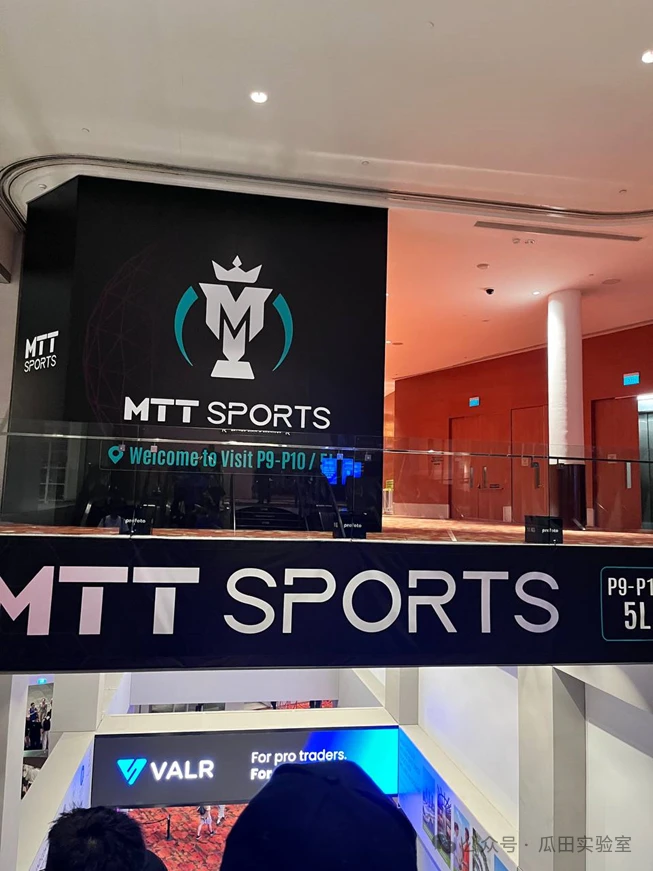
Blockchain technology can improve this aspect by analyzing player big data recorded on the blockchain to determine which accounts are colluding or farming within a certain range, and then take action. If players disagree, they can appeal, as all previous actions are recorded on the blockchain.
1.3 How to Protect Fund Security: Decentralized Wallets
If Texas Hold'em players still remember how Full Tilt Poker, which was once very popular over a decade ago, went bankrupt, they would wholeheartedly support the introduction of decentralized wallets.

Full Tilt Poker was the second largest platform after Pokerstars, even having poker legend Ivey endorse it. However, the centralized system led the team to lose $400 million of players' deposits, leaving only $60 million, causing many players to lose everything.
Such incidents are quite common in the crypto space; the FTX incident is a replica of Full Tilt Poker. If players could log in to online Texas Hold'em using decentralized wallets, keeping their main assets in those wallets, the project team would have no authority to access those assets. The centralized account of the project would only hold a small amount of funds to facilitate game processes, ensuring that even if the project runs away, the vast majority of assets remain in the players' wallets.
1.4 Convenience of Circulation and Payments: Automatic Settlement of Cross-Border Contracts
A long time ago, when I played on Pokerstars, I could only find sellers on certain platforms to recharge my account. This bizarre business model existed due to circulation obstacles. What if a certain region doesn't have those platforms? The final benefit that blockchain brings to online Texas Hold'em is that as long as there is internet access, players can acquire entry chips, and the rewards are automatically settled through contracts embedded in the game rules. If players want to cash out, they can do so through WEB3 withdrawal channels.
In this article, we summarize how blockchain can change several inherent characteristics of WEB2 "online Texas Hold'em," directly addressing pain points that users suffer from but have to accept due to WEB2 online Texas Hold'em projects. Projects that combine blockchain technology to create a chemical reaction can help the team, investors, and users establish a slightly longer-term consensus: that this project is at least making efforts to change some existing unreasonable phenomena. In the next article, we will discuss some actual WEB3 Texas Hold'em project cases in detail.
Next, we will analyze which pioneers have already emerged in the current market using case studies. Over the past few years, many projects have ventured into WEB3 online Texas Hold'em, and there are over a dozen that our community members have researched and experienced: Coinpoker, W3poker, NUTSDAO, GalaGame PokerGO, XCard 7Deuce, zkHoldem, PokerDAO (Mental Poker), InPoker, Web3 Poker Club, DreamPokerClub, Macondo, CCpoker, ChipChip, MTT Sports…
Many projects have already disappeared as of today, some are still operating at low costs, but their daily active user data is quite poor. To be frank, some teams simply packaged a set of online Texas Hold'em code with the WEB3 concept, issued NFTs, then launched tokens, made some money, and ran away. But this can be considered basic operations in WEB3. So far, very few projects have managed to sustain operations and maintain a viable business model. In the WEB3 world, we selected one influential case each from the two types of Texas Hold'em: cash games and tournaments for analysis.
### Case 1: Representative of Cash Games - Coinpoker
Coinpoker can be considered a perennial player in WEB3 online Texas Hold'em. Over the years, I have only been able to play on Coinpoker due to a lack of options. To put it bluntly, it’s a last resort because most WEB3 online Texas Hold'em projects have shut down within a year. Coinpoker has been operating since 2017 and is relatively stable.
One point that Coinpoker emphasizes in its external communications is the transparency and fairness of dealing, and the RNG (Random Number Generator) it uses has been publicly verified. The game mode is primarily cash games, where users can deposit USDT to join tables, with around 500 players online daily.
The project issued a CHP Token (see the chart below), which is not listed on any exchanges and is only available on decentralized DEXs. The token's utility and design are quite average. We feel that cash game projects are often classified under gambling, so investment institutions and exchanges are hesitant to engage with such projects.
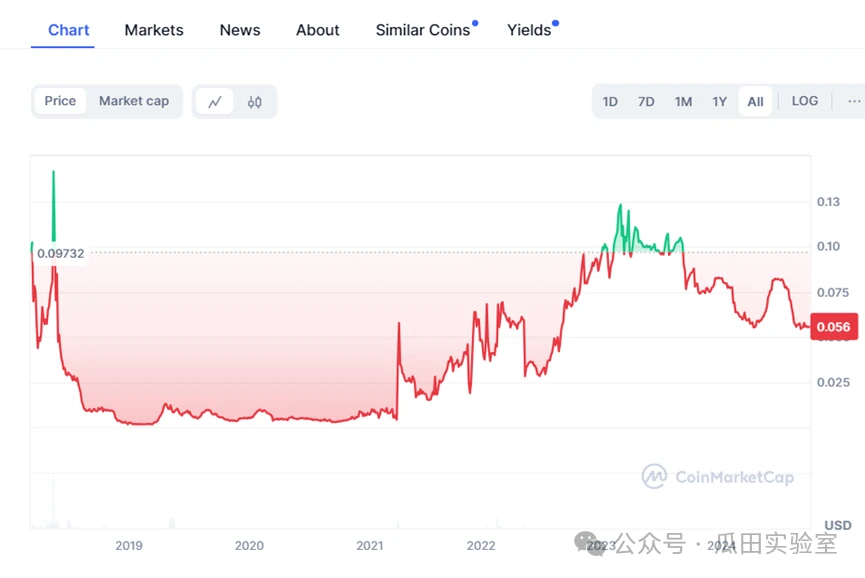
In terms of product experience, I have many complaints. Here are two screenshots for everyone to see:
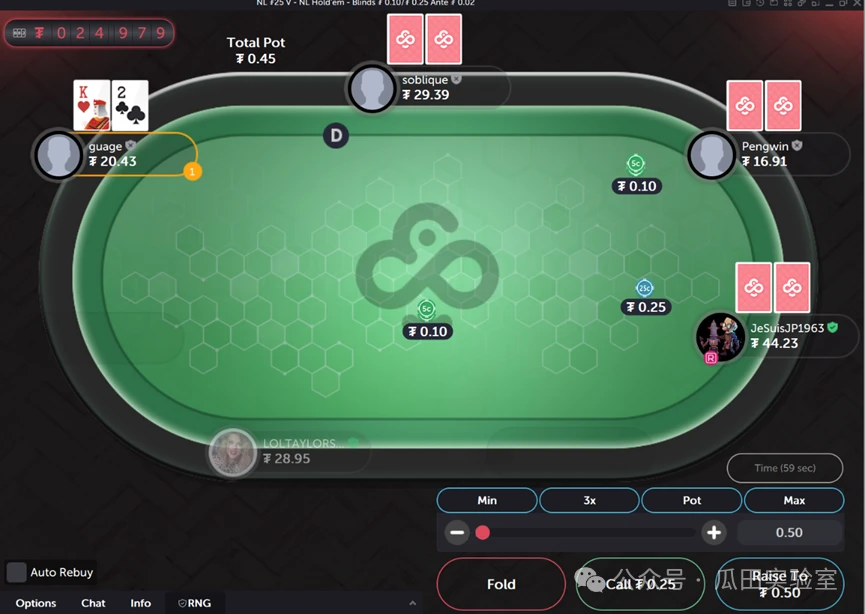
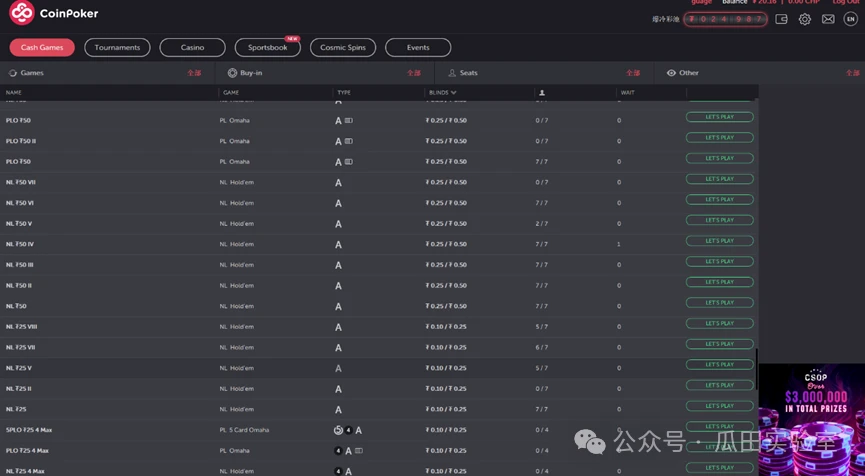
The table interface: Players are not centered; there is only one quick key for raising, which is three times the bet; there are no quick keys for Check/Call…
Main interface: It seems to have many functions, but only cash games are popular, and finding a table is visually overwhelming…
These poor product experiences made it difficult for me, someone who has been accustomed to WEB2 online Texas Hold'em like Pokerstars for years, to adapt. It felt like switching from a 4G network to a 2G one. Even the crucial recharge step was confusing, with no user guidance. I only confirmed I was on the right track after tentatively trying a small amount. The reason Coinpoker currently dominates the WEB3 cash game online Texas Hold'em scene is not because it is exceptionally good, but because its competitors are simply too poor. After two or three years, most have not survived, let alone compare user experiences. It’s no wonder that many WEB2 investment institutions view WEB3 products as a Ponzi scheme; for years, they have failed to improve product experiences and only focus on customer experience and token issuance.
Of course, Coinpoker does have two commendable points: first, withdrawals are almost instantaneous; second, user registration only requires an email and phone number, making it easy for WEB2 users to enter.
### Case 2: Representative of Tournaments - MTT Sports
When we first encountered this product, we noticed that its white paper clearly states the mission of the MTT Sports Foundation: to use decentralized technology to create the world's most successful multi-table esports brand and promote MTT model esports projects to enter the Olympics. This ambition is undeniably impressive. Although esports has become a major event in some large sports competitions, such as the inclusion of seven esports games like League of Legends in the 2023 Asian Games, if esports games can truly enter the Olympics, it would significantly enhance the industry's image and help popularize the consensus that poker tournaments are not gambling.
In terms of the current product experience, MTT Sports is not only a dominant presence in WEB3 online Texas Hold'em but also a top-tier product in WEB2. You can try it out for yourself:
https://sports.mtt.xyz/?i=30d8b409
When I first started playing MTT Sports, I distinctly felt several notable features in the product:
This is a web-based product that can be played directly by clicking the link on both computers and mobile devices (the mobile version allows users to create an app icon from the link for easy access), reducing the difficulty of user entry. Many online Texas Hold'em games require downloading an app, which actually increases the difficulty of user access.
Those who have played can experience the smoothness of MTT; a web game can achieve app-like responsiveness and speed, indicating that the project team's technical capabilities must be quite strong.
The login account is fully compatible with three modes: Google account, email + password, and crypto wallet.
A comfortable game interface, here is the computer version:
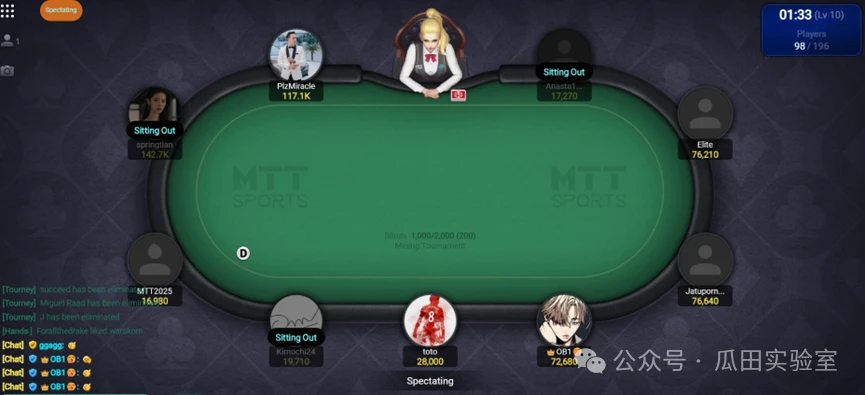
The mobile experience is the best:
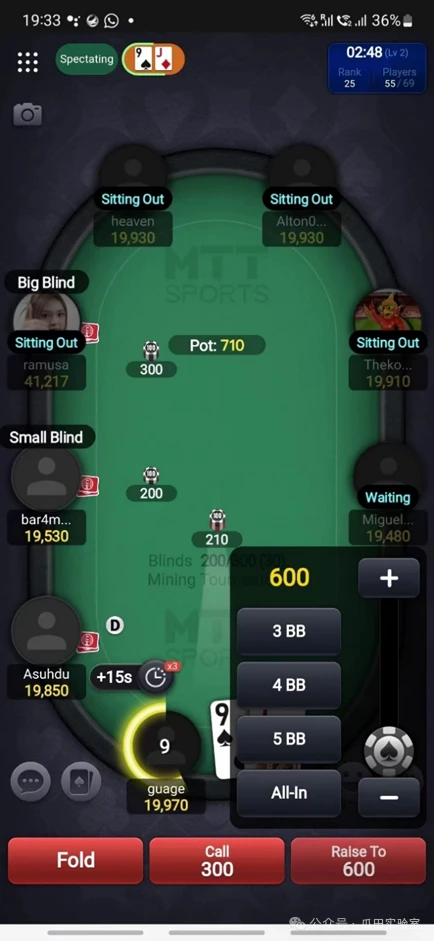
Due to the amazing product experience, we began to track and research the MTT Sports project, hoping to have an opportunity to get involved early.
Here are some analyses after our research:
1. Product Positioning
MTT Sports is not just online Texas Hold'em; as its full English name Multiple Table Tournament Sports suggests, it aims to create a "competition for online multi-table games" that incorporates blockchain technology. Texas Hold'em is the first game of MTT, and it has also developed an EVM public chain based on Cosmos. To clarify, currently, MTT only offers tournaments, not cash games! MTT Sports is positioned as an esports WEB3 project.
Is there a future for online poker esports projects like this? For example, the most influential WEB2 Texas Hold'em event in the world is the WSOP, which had over 10,000 participants in its main event last year, with a total prize pool of $93 million, and the champion could win $12 million.
The economic model of tournaments is simple and effective; the prize pool mainly comes from the entry fees of participants, with a small portion from advertising and other ancillary revenues. This means that players' earnings come from individuals with a genuine willingness to pay, rather than from the principal investments of older users, with returns coming from the principal of subsequent players. Therefore, the economic model of tournaments is healthy and sustainable in the long term. You can profit because you have confidence in the transparency and fairness of the game rules, as well as confidence in your competitive abilities. In contrast, the Ponzi-like competitive model relies mainly on "getting in early + running fast."
2. Project Background
On MTT's Twitter @mtt_sports, we found no descriptions of the project team's background, and the current version of the three white papers does not provide relevant information, only indicating that it is operated by an overseas team.
Before the Token2049 event in Singapore in September 2024, MTT Sports maintained a deliberately low-profile testing image. However, after the competitions began in the first week of October, all metrics started to soar: currently, the Twitter follower count is 16,000, the DC community has 305 members, and the Telegram community has 34,000 members. However, around 600-700 people log in daily to participate in mining competitions and daily tournaments, making it one of the leading projects in daily active users in the WEB3 poker space. Friends who have completed KYC with them know that it is very strict, and most users are genuine. Some community members began testing MTT's beta version before October, mainly due to this official tweet:
https://x.com/mtt_sports/status/1835142937140748674
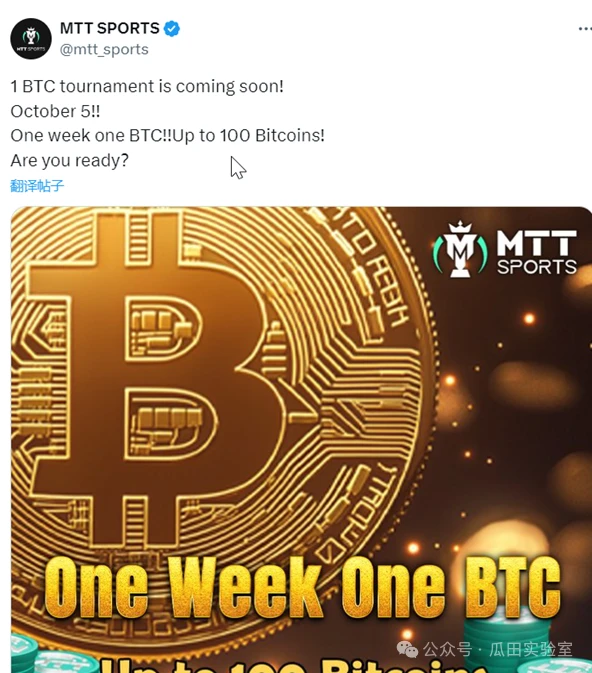
It's very straightforward: starting from October 5, official competitions began, with a BTC reward every week until 100 BTC is distributed! Most WEB3 users are initially drawn by the potential for profit, and some players only started learning Texas Hold'em at that time, so don't compare the learning abilities of WEB3 users, haha! Recently, some friends have privately messaged me asking if this project is reliable and worth following long-term. I can only respond with my personal judgment: definitely worth it! Because we have found some clues about the main investors in this project, who have strong industry experience and technical backgrounds, which explains why MTT Sports can achieve such a good product experience.
3. Project Planning
MTT Sports has three sets of white papers: one for the public chain MTT Network, one for MTT Tournament, and one discussing token economics. To promote MTT Sports, the project adopts a user-free entry model, which is what WEB3 users love most—getting something for free. As long as you believe your poker skills are good, those ranked higher can receive rewards. Currently, several levels of online competitions have been launched, which will be detailed later in this article.
There are also some points in the white paper that particularly caught my attention:
- There will be large offline competitions every year, which seems to be aimed at competing with WSOP;
- Individuals who qualify will be allowed to establish clubs for management, and our community aims to become one of the first club founders;
- A very strict identity verification mechanism, with the highest level requiring facial recognition;
- The RNG dealing mechanism is described in great detail, but the current white paper does not mention how to verify whether this mechanism is transparent and fair, nor whether blockchain technology has been integrated into the dealing mechanism.
4. Economic Model
Currently, the main rewards for players participating in mining competitions, daily competitions, and weekly competitions are MTT Tokens (weekly competitions also have BTC rewards), which is the only token for MTT Sports. The total supply is 2.1 billion tokens, and it is not yet listed on CEX or DEX. The distribution chart is as follows (detailed explanations can be found in the white paper):
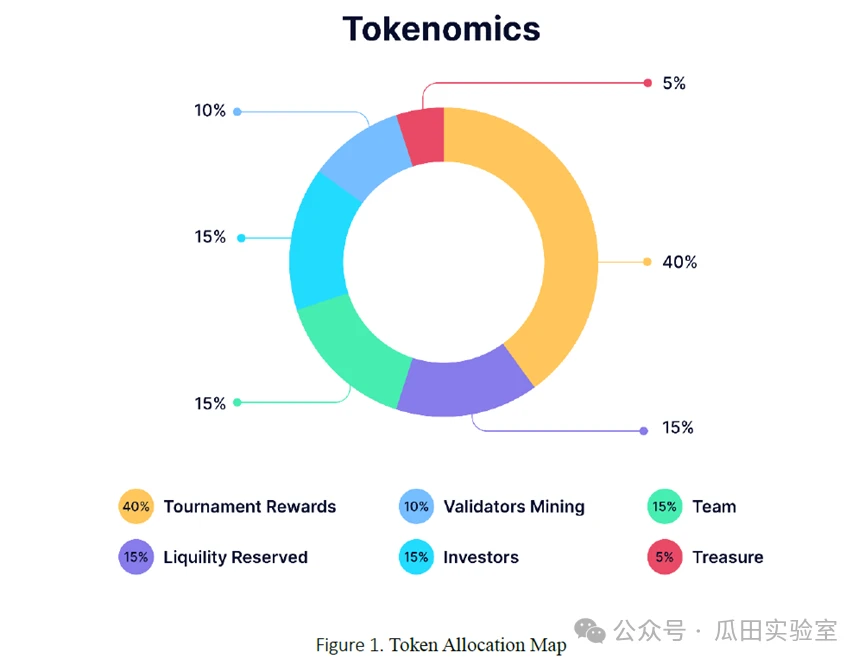
It can be seen that the main output comes from competition rewards, accounting for 40%. This version of the white paper provides a detailed explanation of the output of MTT tokens, which we summarize and list in the chart below. However, the white paper mentions very little about the consumption scenarios for MTT, so we can only write based on the current product experience.
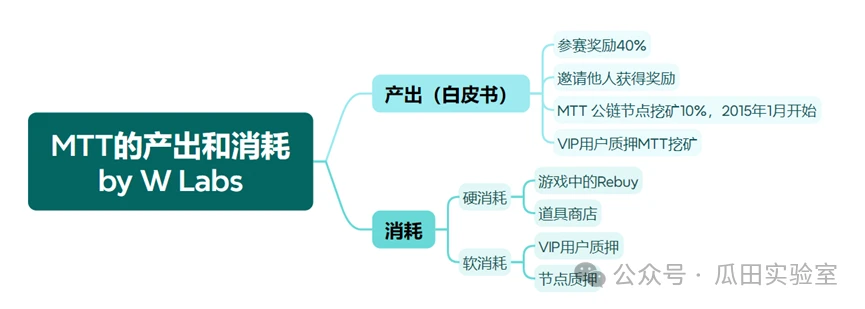
In fact, there can be many consumption scenarios for MTT Tokens. After brainstorming within W Labs, here are a few for the project team to consider:
Low-tier competitions can be entered for free, while high-tier competitions and offline events can use MTT tokens as entry tickets;
Players can establish and operate clubs, requiring the staking of MTT tokens. After the project gains popularity, club seats can be auctioned off, with MTT tokens as the bidding medium;
During offline events and activities, some peripheral sales and partner sales can be paid for with MTT.
So, from an economic model perspective, MTT Sports does not have as many gimmicks as other WEB3 projects, with no NFTs and a single token, which aligns well with the business logic of competitive events: to make money, you need to win. The current tournament model can serve as the foundational scenario for MTT Sports, and future scenarios could include club competitions or celebrity poker tournaments featuring MTT champions, etc. Haha, at that time, the application scenarios for MTT Tokens will be even more abundant.
5. How to Get Started
Let's briefly explain using the computer web version as an example:
New users enter the website, first register an account, and then undergo KYC verification based on their level. Then, on the left sidebar of the main interface, select Tourney to enter.
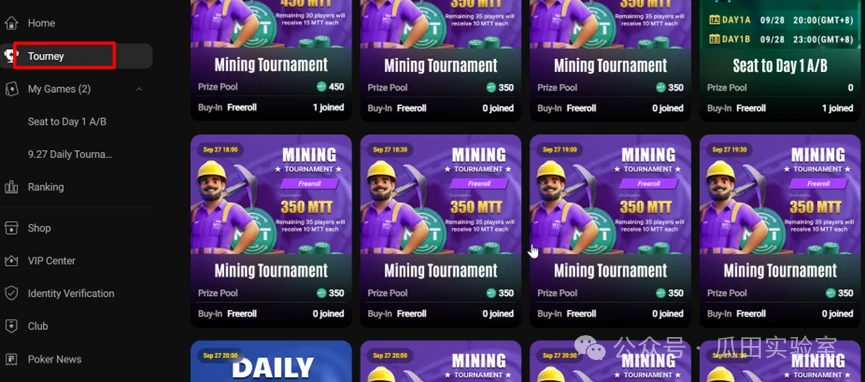
In the Tourney section, there are currently three types of events that you can register for and join at the scheduled time:
Hourly mining competitions (purple icon):
The top 20-40 players (money circle) are determined based on the number of participants, with each receiving 10-15 MTT Tokens. The rule is that the competition ends when the specified number of players is eliminated. Before October, the first place also received the title of champion, with a small reward but great honor! The mining competition is meant for practice.
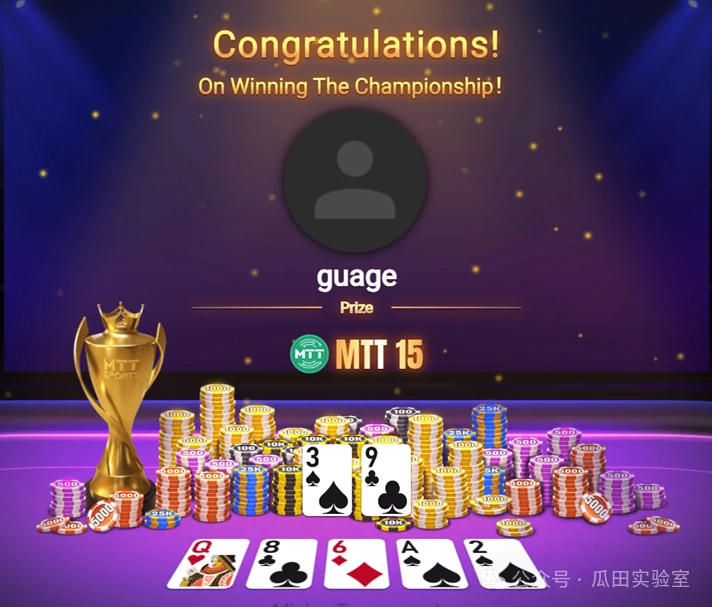
Daily competitions starting at 20:00 (UTC+8) (blue icon):
Once in the money circle, the goal is to determine the first place, with different rewards for different ranks. For example, the first place in the daily competition has a reward of around 800 MTT Tokens.
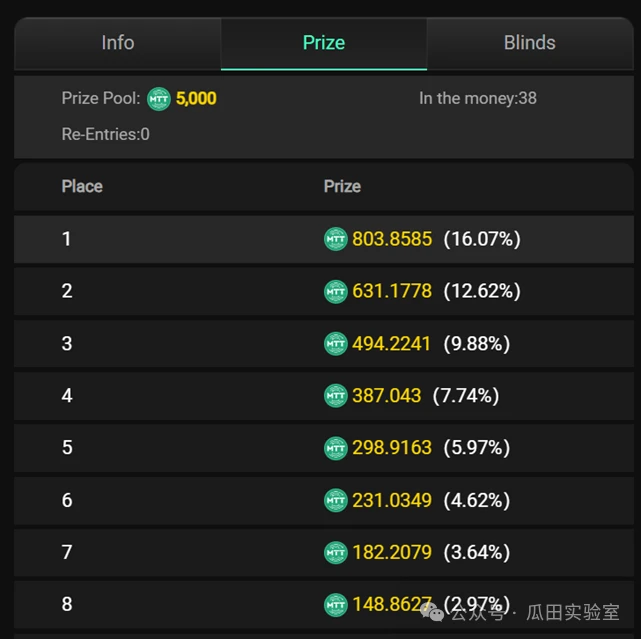
Weekly competitions on weekends (green icon):
Currently, this is the event with the highest rewards, with a total prize pool of 1 BTC + 100,000 MTT tokens each week. The final table of 9 players shares 1 BTC, while the top 200 players split 100,000 MTT tokens. The weekly competition has the highest number of participants, with nearly a thousand participants in the first week of competition.
From Tuesday to Friday, there are multiple qualifying rounds (Seat to DAY1), with the top few ranks receiving an entry ticket to the weekly competition. On Saturday, users with entry tickets can participate in the DAY1A competition at 20:00 or the DAY1B competition at 24:00. If they happen to lose all their chips, there is one opportunity to re-enter, but it requires spending 110 MTT tokens. Those ranked at the top of DAY1 can enter the DAY2 competition on Sunday night at 20:00, bringing their chips from DAY1 into the DAY2 competition, which is a cutthroat elimination round, the most grueling, with only 9 players remaining to enter the final table on Monday night at 20:00.
After registering for the event, click on My Games under Tourney to see how many events you are preparing to participate in, with a countdown added to remind you when to enter.
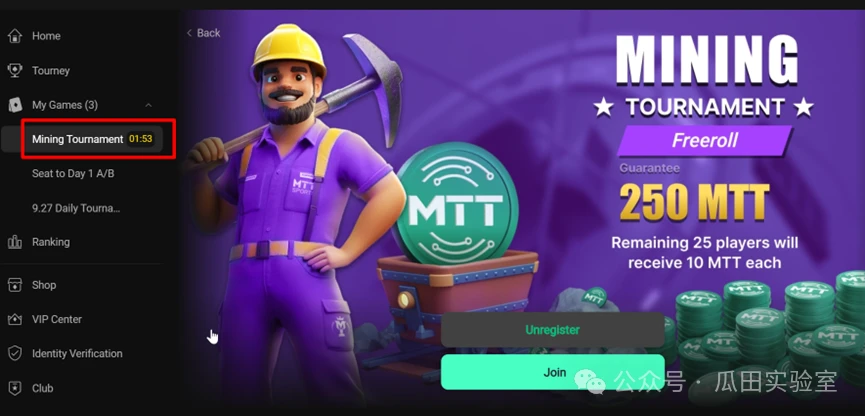
There are also features like Rank and Shop that have been opened, and everyone can explore and familiarize themselves with them.
6. Future Outlook
MTT Sports occupies a very unique position in the WEB3 space, being the only product we have seen that focuses solely on tournaments without cash games, while other online poker games include cash game formats. This opens the door for many investment institutions and exchanges that are optimistic about Texas Hold'em and esports to support MTT tokens: MTT Sports does not involve sensitive gambling, so cooperation is possible.
Currently, MTT Sports has a clear profit model; as long as ticket revenues and other income exceed the prize pool income, this is a profitable business model. Coupled with the strong backing of 100 BTC from shareholders, it can ensure the long-term operation of the project.
Currently, users participating in various competitions can earn MTT tokens, which they can hold while waiting for their value to be realized. We believe MTT tokens may bring even greater surprises.
To summarize this article, W Labs has been navigating the WEB3 application space for over three years, covering categories such as blockchain games, social applications, and RWA, constantly exploring what types of projects can attract real users and establish long-term business models.
Two points have already gained some consensus among our community members:
First, blockchain technology can be used to address the shortcomings of WEB2 products or upgrade them to achieve better user experiences, such as improving dealing, anti-cheating, and asset storage in online Texas Hold'em through blockchain technology;
Second, the product quality itself should at least be polished to a normal level; we don't expect all products to be "Black Myth: Wukong," but they should at least not appear substandard.
This concludes the article.
Disclaimer
The information in this material is sourced from publicly available materials or other sources that we consider reasonable and reliable. Guatian Laboratory makes no express or implied guarantees regarding the accuracy, adequacy, completeness, or appropriateness of this information.
The information, introductions, data, etc., in this material are for the reference of readers only. Under no circumstances should any content in this material be considered an invitation or recommendation, nor does it constitute investment advice. Investors bear all risks associated with investing in related project assets (including but not limited to: investment risks, management risks, legal risks, tax risks, liquidity risks, credit risks, policy risks, economic cycle risks, interest rate risks, operational risks, risks due to force majeure, etc.). Guatian Laboratory and/or its affiliates bear no legal responsibility for any consequences arising from reliance on or use of this material.
No institution or individual may reproduce, disseminate, or modify the content of this material in any form without the written consent of Guatian Laboratory.
免责声明:本文章仅代表作者个人观点,不代表本平台的立场和观点。本文章仅供信息分享,不构成对任何人的任何投资建议。用户与作者之间的任何争议,与本平台无关。如网页中刊载的文章或图片涉及侵权,请提供相关的权利证明和身份证明发送邮件到support@aicoin.com,本平台相关工作人员将会进行核查。



